MAINTENANCE
Page 54
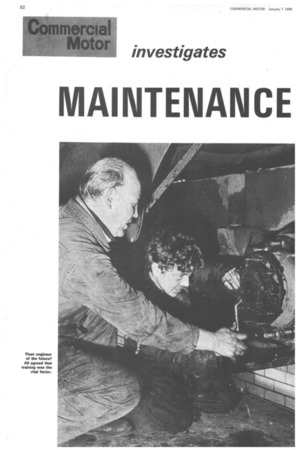
Page 55
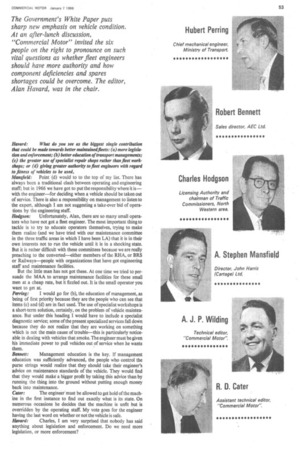
Page 56
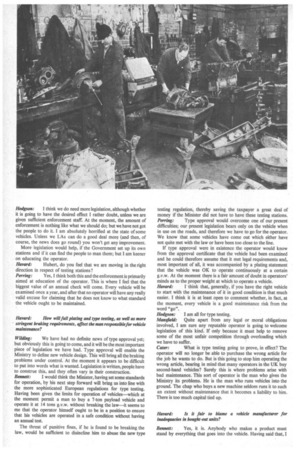
Page 57
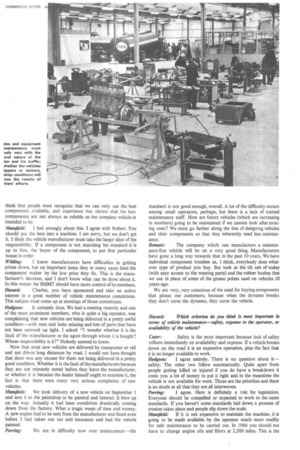
Page 58
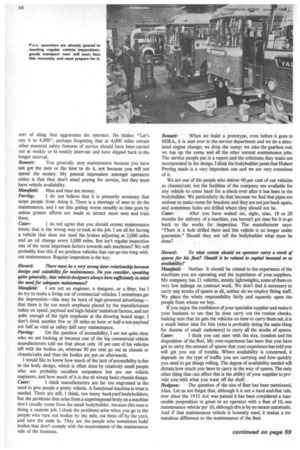
Page 61
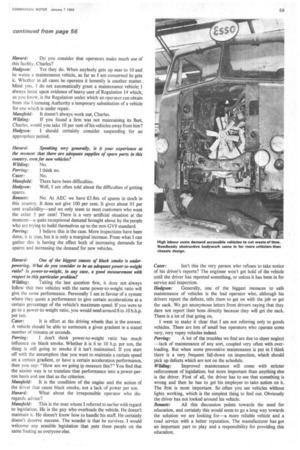
If you've noticed an error in this article please click here to report it so we can fix it.
Havard: What do you see as the biggest single contribution
that could be made towards better maintained/leets: (a) more legislation and enforcement; (b)better education of transport managements; (c) the greater use of specialist repair shops rather than fleet workshops; or (d) giving greater authority to fleet engineers with regard to fitness of vehicles to be used, Mensftekl: Point (d) would to to the top of my list. There has always been a traditional clash between operating and engineering staff; but in 1966 we have got to put the responsibility where it is— with the engineer—for deciding when a vehicle should be taken out of service. There is also a responsibility on management to listen to the expert, although I am not suggesting a take-over bid of operations by the engineering staff.
Hodgson: Unfortunately, Alan, there are so many small operators who have not got a fleet engineer. The most important thing to tackle is to try to educate operators themselves, trying to make them realize (and we have tried with our maintenance committee in the three traffic areas in which I have been LA) that it is in their own interests not to run the vehicle until it is in a shocking state. But it is rather difficult with these committees because we are really preaching to the converted—either members of the RHA, or BRS or Railways—people with organizations that have got engineering staff and maintenance facilities.
But the little man has not got these. At one time we tried to persuade the MAA to arrange maintenance facilities for these small men at a cheap rate, but it fizzled out. It is the small operator you want to get at.
Perring: I would go for (b), the education of management, as being of first priority because they are the people who can see that items (c) and (d) are in fact used. The use of specialist workshops is a short-term solution, certainly, on the problem of vehicle maintenance. But under this heading I would have to include a specialist diagnostic service; some of the present specialized services fall clain because they do not realize that they are working on something which is not the main cause of trouble—this is particularly noticeable in dealing with vehicles that smoke. The engineer must be given his immediate power to pull vehicles out of service when he wants them.
Bennett: Management education is the key. If management education was sufficiently advanced, the people who control the purse strings would realize that they should take their engineer's advice on maintenance standards of the vehicle. They would find that they would make a bigger profit by taking this advice than by running the thing into the ground without putting enough money back into maintenance.
cater: The engineer mustbe allowed to get hold of the machine in the first instance to find out exactly what is its state. On numerous occasions he decides that the machine is unfit but is overridden by the operating staff. My vote goes for the engineer having the last word on whether or not the vehicle is safe,
Havard: Charles, I am very surprised that nobody has said anything about legislation and enforcement. Do we need more legislation, or more enforcement? .
Hodgson: I think we do need more legislation, although whether it is going to have the desired effect I rather doubt, unless we are given sufficient enforcement staff. At the moment, the amount of enforcement is nothing like what we should do; but we have not got the people to do it. I am absolutely horrified at the state of some vehicles. Unless we LAs can do a good deal more (and then, of course, the news does go round) you won't get any improvement.
More legislation would help, if the Government set up its own stations and if it can find the people to man them; but I am keener on educating the operator.
Havard: Hubert, do you feel that we are moving in the right direction in respect of testing stations?
Perring: Yes, I think both this and the enforcement is primarily aimed at education of the operator. This is where I feel that the biggest value of an annual check will come. Every vehicle will be examined once a year, and after that no operator will have any really valid excuse for claiming that he does not know to what standard the vehicle ought to be maintained.
Havard: How will full plating and type testing, as well as more stringent braking requirements, affect the man responsible for vehicle maintenance?
Wilding: We have had no definite news of type approval yet; but obviously this is going to come, and it will be the most important piece of legislation we have had. Type approval will enable the Ministry to define new vehicle design. This will bring all the braking problems under control. At the moment it appears to be difficult to put into words what is wanted. Legislation is written, people have to construe this, and they often vary in their construction.
Bennett: I would think the Minister, having set some standards for operation, by his next step forward will bring us into line with the more sophisticated European regulations for type testing. Having been given the limits for operation of vehicles—which at the moment permit a man to buy a 7-ton payload vehicle and operate it at 14 tons g.v.w. without breaking the law—it seems to me that the operator himself ought to be in a position to ensure that his vehicles are operated in a safe condition without having an annual test.
The threat of punitive fines, if he is found to be breaking the law, would be sufficient to disincline him to abuse the new type testing regulation, thereby saving the taxpayer a great deal of money if the Minister did not have to have these testing stations.
Perring: Type approval would overcome one of our present difficulties; our present legislation bears only on the vehicle when in use on the roads, and therefore we have to go for the operator. We know that some vehicles have come out which either have not quite met with the law or have been too close to the line.
If type approval were in existence the operator would know from the approval certificate that the vehicle had been examined and he could therefore assume that it met legal requirements and, most important of all, it was accompanied by a plating statement that the vehicle was OK to operate continuously at a certain g.v.w. At the moment there is a fair amount of doubt in operators' minds as to the proper weight at which to operate a vehicle.
Havard: I think that, generally, if you have the right vehicle to start with the maintenance of it in good condition is that much easier. I think it is at least open to comment whether, in fact, at the moment, every vehicle is a good maintenance risk from the word "go".
Hodgson: I am all for type testing.
Mansfield: Quite apart from any legal or moral obligations involved, I am sure any reputable operator is going to welcome legislation of this kind. If only because it must help to remove some of the most unfair competition through overloading which we have to suffer.
Cater: What is type testing going to prove, in effect? The operator will no longer be able to purchase the wrong article for the job he wants to do. But is this going to stop him operating the wrong article, bearing in mind that many operators in the UK buy second-hand vehicles? Surely this is where problems arise with bad maintenance. This sort of operator is the man who gives the Ministry its problems. He is the man who runs vehicles into the ground. The chap who buys a new machine seldom runs it to such an extent without maintenance that it becomes a liability to him. There is too much capital tied up.
Havard: Is it fair to blame a vehicle manufacturer for inadequacies in bought-out units?
Bennett: Yes, it is. Anybody who makes a product must stand by everything that goes into the vehicle. Having said that, I think that people must recognize that we can only use the best components available, and experience has shown that the best components are not always as reliable as the complete vehicle is intended to be.
Mansfield: 1 feel strongly about this. I agree with Robert. You should put the best into a machine. I am sorry, but we don't get it. I think the vehicle manufacturer must take the larger slice of the responsibility. If a component is not matching his standard it is up to him, the buyer of the component, to put that particular house in order.
Wilding: I know manufacturers have difficulties in getting prices down, but on important items they in many cases limit the component maker by the low price they fix. This is the manufacturer's decision, and I don't know what can be done about it. In this matter the SMMT should have more control of its members.
Havard: Charles, you have sponsored and take an active interest in a great number of vehicle maintenance committees. This subject must come up at meetings of those committees.
Hodgson: It certainly does. We had a meeting recently and one of the most prominent members, who is quite a big operator, was complaining that new vehicles are being delivered in a pretty awful condition—with nuts and bolts missing and lots of parts that have not been screwed up tight. I asked: "I wonder whether it is the fault of the manufacturer or the agent through whom it is bought? Whose responsibility is it?" Nobody seemed to know.
Now that most new vehicles are delivered by transporter or rail and not driven long distances by road, I would not have thought that there was any excuse for them not being delivered in a pretty good condition. Whether it is the fault of the manufacturers because they are not minutely tested before they leave the manufacturer, or whether it is because the dealer himself ought to examine it, the fact is that there were many very serious complaints of new vehicles.
Mansfield: We took delivery of a new vehicle on September 1 and sent it to the paintshop to be painted and lettered. It blew up on the way. Actually it had been overdriven drastically coming down from the factory. What a tragic waste of time and money. A new engine had to be sent from the manufacturer and fitted even before I had taken out tax and insurance and had the vehicle painted.
Perring: We are in difficulty now over maintenance—the standard is not good enough, overall. A lot of the difficulty occurs among small operators, perhaps, but there is a lack of trained maintenance staff. How are future vehicles (which are increasing in numbers) going to be maintained if we cannot look after existing ones? We .must go farther along the line of designing vehicles and their components so that they inherently need less maintenance.
Bennett: The company which can manufacture a maintenance-free vehicle will be on a very good thing. Manufacturers have gone a long way towards that in the past 10 years. We have individual component troubles as, I think, everybody does whatever type of product you buy. But look at the tilt cab of today (with easy access to the wearing parts) and the rubber bushes that we use in place of some of the grease points used on vehicles 10 years ago.
We are very, very conscious of the need for buying components that please our customers; because when the dynamo breaks they don't curse the dynamo, they curse the vehicle.
flavard: Which criterion do you think is most important in terms of vehicle maintenance—safety, expense to the operator, or availability of the vehicle?
Cater: Safety is the most important because lack of safety reflects immediately on availability and expense. If a vehicle breaks down on the road it is an expensive operation, plus the fact that it is no longer available to work.
Hodgson: I agree entirely. There is no question about it safety. The other two follow automatically. Quite apart from people getting killed or injured if you do have a breakdown it costs you a lot of money to put it right and in the meantime the vehicle is not available for work. Those are the priorities and there is no doubt at all that they are all interwoven.
Perring: I agree. Here is definitely a role for legislation. Everyone should be compelled or expected to work to the same standards. If you haven't some standards laid down a process of erosion takes place and people slip down the scale.
Mansfield: If it is not expensive to maintain the machine, it is going to be made available by the operator much more readily for safe maintenance to be carried out. In 1966 you should not have to change engine oils and filters at 2,500 miles. This is the sort of thing that aggravates the operator. He thinks: "Let's run it to 4,000", perhaps forgetting that at 4,000 miles certain other essential safety features of service should have been carried out at weekly or bi-weekly intervals and have slipped back to the longer interval.
Bennett: You generally stop maintenance because you have not got the men or the time to do it, not because you will not spend the money. My general impression amongst operators today is that they don't mind paying for service, but they must have vehicle availability.
Mansfield: Men and time are money.
Perring: I do not believe that it is primarily economy that stops people from doing it. There is a shortage of men to do the maintenance, and I see this getting worse steadily as time goes by unless greater efforts are made to attract more men and train them.
Cater: I do not agree that you should extena maintenance times; that is the wrong way to look at the job. I am all for having a vehicle that does not need the brakes adjusting at 2,000 miles and an oil change every 3,000 miles. But isn't regular inspection one of the most important factors towards safe machines? We will probably lose this if we produce vehicles that can go too long without maintenance. Regular inspection is the key.
Havard: There must be a very strong inter-relationship between design and suitability for maintenance. Do you consider, speaking quite generally, that vehicle designers always have sufficiently in mind the need for adequate maintenance?
Mansfield: I am not an engineer, a designer, or a fitter, but do try to make a living out of commercial vehicles. I sometimes get the impression—this may be born of high-powered advertising— that there is far too much emphasis placed by the manufacturers today on speed, payload and high-falutin' statistical factors, and not quite enough of the right emphasis at the drawing board stage. I don't think another five or 10 miles an hour or half-a-ton payload are half as vital as safety and easy maintenance.
Perring: On the question of accessibility, I am not quite clear who we are looking at because one of the big commercial vehicle manufacturers told me that about only 10 per cent of his vehicles left with the bodies on, whereas 90 per cent go out as chassis or chassis/cabs and then the bodies are put on afterwards.
I would like to know how much of the lack of accessibility is due to the body design, which is often done by relatively small people who are probably excellent carpenters but are not vehicle engineers, and how much of it is due to wrong basic chassis design.
Cater: I think manufacturers are far too engrossed in the need to give people a pretty vehicle. A functional machine is what is needed. There are still, I think, too many backyard bodybuilders; but the problems that arise from a superimposed body on a machine don't usually come from the small bodybuilder, because this man is doing a custom job. I think the problems arise when you go to the people who turn out bodies by the mile, cut them off by the yard, and turn the ends in. They are the people who sometimes build bodies that don't comply with the requirements of the maintenance side of the business. Bennett: When we build a prototype, even before it goes to MIRA, it is sent over to the service department and we do a simulated engine change; we drop the sump; we take the gearbox out; we top up the sump and all the other normal maintenance jobs. The service people put in a report and the criticisms they make are incorporated in the design. I think the bodybuilder point that Hubert Perring made is a very important one and we are very conscious of it.
We are one of the people who deliver 90 per cent of our vehicles as chassis/cab; but the facilities of the company are available for any vehicle to come back for a check-over after it has been to the bodybuilder. We particularly do that because we find that pipes are undone to make room for brackets and they are not put back again, and sometimes holes are drilled where they should not be.
Cater: After you have waited six, eight, nine, 18 or 20 months for delivery of a machine, you haven't got time for it to.go back to the works for inspection. The manufacturer says: "There is a hole drilled there and this vehicle is no longer under guarantee." Should they not tell the bodybuilder what must be done?
Havard: To what extent should an operator carry a stock of spares for his fleet? Should it be related to capital invested or to availability?
Mansfield: Neither. It should be related to the experience of the machines you are operating and the experience of your suppliers. My company has 21 vehicles, mostly lightweights, some of them on very low mileage on contract work. We don't find it necessary to carry any stocks of spares at all, neither do we employ fitting staff. We place the whole responsibility fairly and squarely upon the people from whom we buy.
If you enjoy the confidence of your specialist supplier and make it your business to see that he does carry out the routine checks, making sure that he gets the vehicles on time to carry them out, it is a much better idea for him (who is probably doing the same thing for dozens of small customers) to carry all the stocks of spares.
Cater: I think you can start with the size, location and the disposition of the fleet. My own experience has been that you have got to carry the amount of spares that your experience has told you will get you out of trouble. Where availability is concerned, it depends on the type of traffic you are carrying and how quickly you need to get things rolling. The degree of availability needed will dictate how much you have to carry in the way of spares. The only other thing that can affect this is the ability of your supplier to provide you with what you want off the shelf.
Hodgson: The question of the size of fleet has been mentioned, Alan. Let us not forget that, although it is not a hard-and-fast rule, ever since the 1933 Act was passed it has been considered a reasonable proposition to grant to an operator with a fleet of 10, one maintenance vehicle per 10, although this is by no means automatic. And if that maintenance vehicle is honestly used, it makes a tremendous difference to the maintenance of the fleet. Havard: Do you consider that operators make much use of this facility, Charles?
Hodgson: Yes they do. When anybody gets up near to 10 and he wants a maintenance vehicle, as far as I am concerned he gets it. Whether in all cases he operates it honestly is another matter. Mind you, I do not automatically grant a maintenance vehicle; I always insist upon evidence of heavy user of Regulation 14 which, as you know, is the Regulation under which an operator can obtain from the licensing Authority a temporary substitution of a vehicle for one which is under repair.
Mansfield: It doesn't always work out, Charles.
Wilding: If you found a firm was not maintaining its fleet, Charles, would you take 10 per cent of his vehicles away from him?
Hodgson: I should certainly consider suspending for an appropriate period.
Havard: Speaking very generally, is it your experience at the moment that there are adequate supplies of spare parts in this country, even for new vehicles?
Wilding: No.
Perring: I think no.
Cater: No.
Mansfield: There have been difficulties.
Hodgson: Well, I am often told about the difficulties of getting spares.
Bennett: No. At AEC we have'£5.8m. of spares in stoat in this country. It does not give 100 per cent. It gives about 95 per cent availability—and we only seem to meet customers who want the other 5 per cent! There is a very artificial situation at the moment—a quite exceptional demand brought about by the people who arc trying to build themselves up to the non-0V9 standard.
Perring: I believe this is the case. More inspections have been done, it is true, but it is only a marginal increase. From what I can gather this is having the effect both of increasing demands for spares and increasing the demand for new vehicles.
Havard: One of the biggest causes of black smoke is under powering. What do you consider to be an adequate power-to-weight ratio? Is power-to-weight, in any case, a good measurement with respect to this particular problem?
Wilding: Taking the last question first, it does not always follow that two vehicles with the same power-to-weight ratio will give the same performance. Personally I am in favour of a system where they quote a performance to give certain accelerations at a certain percentage of the vehicle's maximum speed. If you were to go to a power-to-weight ratio, you would need around 8 to 10 b.h.p. per ton.
Cater: It is effort at the driving wheels that is the answer. A vehicle should be able to surmount a given gradient in a stated number of minutes or seconds.
Perring: I don't think power-to-weight ratio has much influence on black smoke. Whether it is 6 to 10 h.p. per ton, the thing is still going to smoke if it isn't maintained. If you start off with the assumption that you want to maintain a certain speed on a certain gradient, or have a certain acceleration performance, then you say: "How are we going to measure this?" You find that the easiest way is to translate that performance into a power-perton basis and use that as the criterion.
Mansfield: It is the condition of the engine and the action of the driver that cause black smoke, not a lack of power per ton.
Havard: What about the irresponsible operator who disregards advice?
Mansfield: This is the man whom I referred to earlier with regard to legislation. He is the guy who overloads the vehicle. He doesn't maintain it. He doesn't know how to handle his staff. He certainly doesn't deserve success. The wonder is that he survives. I would welcome any sensible legislation that puts these people on the same footing as everyone else. Cater: Isn't this the very person who refuses to take notice of his driver's reports? The engineer won't get hold of the vehicle until the driver has reported something, or unless it has been in for service and inspection.
Hodgson: Generally, one of the biggest menaces to safe maintenance of vehicles is the bad operator who, although his drivers report the defects, tells them to get on with the job or get the sack. We get anonymous letters from drivers saying that they dare not report their boss directly because they will get the sack. There is a lot of that going on.
I want to make it clear that I am not referring only to goods vehicles. There are lots of small bus operators who operate some very, very ropey vehicles indeed.
Perring: A lot of the troubles we find are due to sheer neglect —lack of maintenance of any sort, coupled very often with overloading. But when some preventive maintenance is put in I think there is a very frequent fall-down on inspection, which should pick up defects which are not on the schedule.
Wilding: Improved maintenance will come with stricter enforcement of legislation; but more important than anything else is the driver. First of all, the driver has to see that something is wrong and then he has to get his employer to take action on it. The first is most important. So often you see vehicles without lights working, which is the simplest thing to find out. Obviously the driver has not looked around his vehicle.
Bennett: All this discussion points towards the need for education, and certainly this would seem to go a long way towards the solution we are looking for—a more reliable vehicle and a road service with a better reputation. The .manufacturer has got an important part to play and a responsibility for providing this education.




















































































































